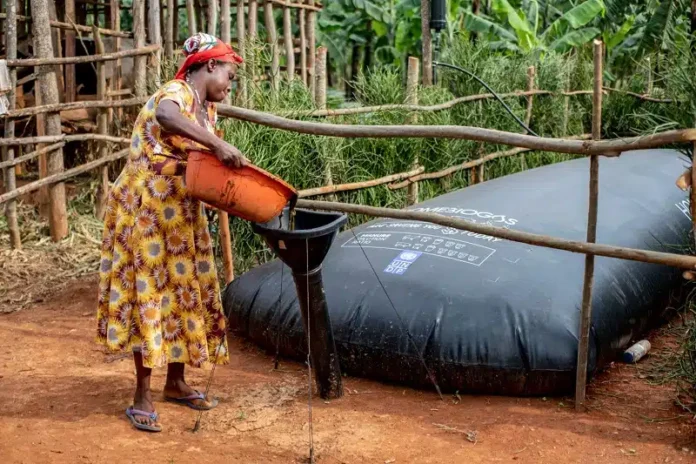UNDP and HomeBiogas launched HomeBiogas’ transformational technology to rural farmers in the Ngoma and Rwamagana district, in the eastern province of Rwanda.
The HomeBiogas systems which now serve 500 Rwandan families, transform the organic waste and animal manure into clean energy for cooking and bio-fertilizer, on-site. The HomeBiogas systems revolutionized farming and household practices, empowering farmers and greatly improving the lives of their families by providing clean cooking solutions, enhancing health, ensuring food security, and promoting gender equality.
According to UNDP interviews, Marie Jose, like many others, used to spend up to four hours daily collecting firewood in challenging conditions, facing physical strain, the risk of assault, and competition with others. This exhausting task left her struggling to feed her children. In Rwanda, where three million households lack cooking power, many families face this cycle of poverty. However, since the installation of a HomeBiogas system, Marie Jose’s life has significantly improved. She now has more time for income generation, and her crops thrive thanks to the fertilizer. This positive change enables her to afford her children’s education, marking a crucial step in breaking the cycle of poverty.
HomeBiogas, is a certified B Corp, develops biogas systems for home and commercial use, offering a solution for waste management while creating renewable energy.
The introduction of HomeBiogas technology is positively impacting women’s lives in several ways. Firstly, it eliminates the need for wood as a cooking fuel, thereby reducing the economic and time-consuming burden of buying or collecting wood. Additionally, it promotes clean cooking in kitchens, mitigating the health risks associated with indoor air pollution.
The project is part of Rwanda’s Green Growth and Climate Resilience Strategy, which aims to scale up renewable energy in rural households with the help of the private sector and international development partners. As a sustainable energy source, biogas is expected to play a pivotal role in the effort to reduce emissions and it can help Rwanda meet its Nationally Determined Contributions (NDCs) under the Paris Agreement.
In the next ten years the HomeBiogas systems are expected to save 15M kgs of firewood, deliver 9M hours of clean cooking, treat 65M kgs of animal manure and save $1.7M for the 500 Rwandan families using The HomeBiogas systems.
By using the HomeBiogas system, farmers can cut their carbon footprint by seven tons of CO2-eq per year by repurposing methane emitted from animal manure for cooking instead of releasing it into the atmosphere. Moreover, the Bio-fertilizer produced through this process serves as a sustainable alternative to chemical fertilizers, enhancing crop yields and promoting soil health, ultimately strengthening plants and facilitating the practice of regenerative agriculture. This innovative approach not only empowers farmers economically through the creation of new revenue opportunities but also cultivates resilience at both the national and personal levels.
The installation of the HomeBiogas systems in Rwanda is HomeBiogas’ third UN project, after previously winning two UN tenders in Zimbabwe and Malawi. The reasons for the UN’s choice of Israeli technology lie in the fact that HomeBiogas serves as an infrastructure which can be installed quickly (500 units were installed within four months). In addition, HomeBiogas supports the installation and grants product liability, along with the fact that the HomeBiogas systems are simple to install, durable for a period of fifteen years, and are easy to use.
Oshik Efrati, Founder and CEO of HomeBiogas: “We are grateful to bring our technology to 500 families in Rwanda. We see this project as an important contribution to the lives of the farmers of Rwanda and as a business development we believe will lay the foundation for additional opportunities. We are witnessing a growing global demand for climate tech and waste management innovation, and we are happy to be part of the solution.”

